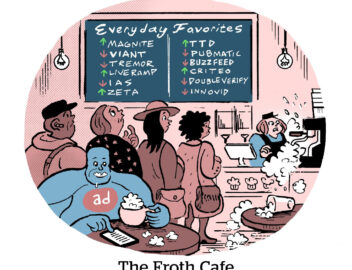

Thank you!
Just one more thing before you go...

lockr Partners With Snowflake, AWS And InfoSum To Help Pubs Root Out Fake Emails
By Allison Schiff – AdExchanger
The machines are learning. They’re also generating emails.
And publishers that monetize on identity could be in for a rude awakening if they don’t have an “MGE mitigation plan” in place as part of their overall email authentication strategy, said Scott Messer, a media consultant and founder of Messer Media.
Yes, MGE. Add it to your list of acronyms.
Machine-generated emails – or burner emails, as they’re sometimes called – are automatically generated random email addresses that people use for privacy reasons or to reduce spam in their inbox.
Rather than registering for a website with a genuine email address, a service like Apple’s Hide My Email allows someone to generate a dummy email account that automatically forwards messages to their real email.
Connections
On Monday, lockr launched a platform called Connections Hub to make it easier for publishers to share their data for MGE analysis, which CEO and Founder Keith Petri acknowledged can be difficult.
Lockr now has integrations with Snowflake, Amazon Web Services and data clean room InfoSum. It also has a partnership with MadConnect, an API for data interoperability developed by MadTech, a consultancy that works with digital media companies to develop tools to improve their revenue.
You can think of MadConnect as a bit like BidSwitch for data so publishers can share information with partners without having to do a separate integration.
Once the connection is made, lockr can run checks to authenticate a publisher’s file and weed out the MGEs, which, according to lockr’s research, could represent up to 23% of a publisher’s first-party data.
“If there’s a match rate issue between vendors, it’s not necessarily the vendor’s fault if the data going in is unmatchable in the first place,” Petri said. “That’s why we need to look at the health of the data first to make sure that garbage in doesn’t equal garbage out.”
Fakey wakey
If enough fake email addresses make it into a publisher’s first-party data set, their identity backbone starts to break down. For instance, there’s no point in generating a Unified ID 2.0 token based on a temporary email address and trying to match it with other first-party signals.
Machine-generated emails create what Salon CRO Justin Wohl referred to as “false flags for advertisers and dead ends for publishers” trying to build a relationship and a revenue stream through email communication.
Which is hard enough as it is.
Forget getting someone to subscribe and pay money for access to content. Many visitors aren’t willing to share their email when they hit a free registration wall.
One reason for that reticence is because people need a good reason to share their real email address with a publisher or marketer. A flimsy so-called value exchange, like a meh discount or pushing a newsletter sign-up, often isn’t enough.
MGE detection is important, but “if you have a subpar relationship with the reader,” Messer said, “your mechanical or platitudinal efforts to garner real email addresses will be futile.”
Writing on the wall
Although the prevalence of MGEs is still “a niche problem,” Messer said, the stage is set for problems down the road.
For example, there’s no reason why advertisers and potential acquirers won’t ask publishers pointed questions about machine-generated emails as awareness grows.
“I haven’t seen it in an M&A due diligence request yet, but savvy buyers will soon start adding MGE density to the list of quality checks for emails and logins,” Messer said. “At a minimum, you should know how big of an issue – or not – this is for you.”
Wohl is planning to use lockr later this year to figure out what percentage of existing authenticated traffic across Salon and Salon-owned Snopes and TV Tropes is based on MGEs and what percentage of new sign-ups attempt to use them. (Lockr has an API that lets publishers check the validity of an email before allowing a registration.)
Although third-party cookie deprecation on Chrome is still dominating the conversation, the issue of MGEs is waiting in the wings.
“It will become a more obvious issue post-third-party cookies,” Wohl said, “when publishers need to pivot to things like UID2 and find the viability of that strategy thwarted by bad inputs.”
View the original article in AdExchanger.

Machine-Generated Email Cost Calculator
Unlock additional revenue by integrating with Identity lockr.
Select your industry vertical.
How many registered users or newsletter subscribers do you have?
Average monthly emails sent to each subscriber per month?
What is your average email open rate?Optional
What is your average email click rate?Optional
Has lockr previously analyzed the machine-generated emails in your first-party data?
What was the percentage?
Enter your RPM (page revenue per 1,000 sessions).
What is your average monthly subscriber growth rate?
What is your anonymous web visitors monthly pageview traffic?
What is your authenticated monthly pageview traffic?
Projected Incremental Revenue
Projected Annual MGE Overhead
| MGE Fees | $0 |
| MGE Lost Email Revenue | $0 |
| MGE Advertising Leakage | $0 |
| One month of Email Jail | $0 |
| Incremental Revenue | $0.0M |
Enter your email to receive the full report.
Are you sure you want to leave?
Changes you made will not be saved.







